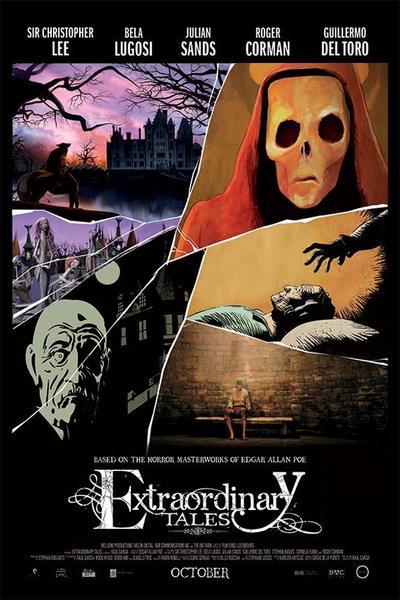“Extraordinary Tales”: a gorgeous, macabre tribute to Edgar Allan Poe
November 16, 2015
Horror is a genre that I typically am not a fan of. Things like “Paranormal Activity” and “The Conjuring” are sub par in my opinion. However, I do enjoy horror if it is handled in a way that shakes me to my core. That’s why Edgar Allan Poe is one of my favorite writers. His words stick with me still in no way a dumb jump scare ever will.
So when I found out about the film “Extraordinary Tales”, an animated anthology film telling five of Poe’s stories with a different, somewhat unconventional animation style for each one, I was excited. Despite the popularity of his stories, Poe is hardly ever adapted (or at least adapted well). While I understand that this film in flying under the radar at the moment, its’ effect on me is something I had to talk about and highly recommend seeing this movie by any means.
The film is directed by Raúl García, who has a past with Disney films like “The Lion King” and “Aladdin”. However, each of the stories he tells are far different than any Disney film or any animation I’ve seen in my life. As each story is it’s own film in a way, this review will be going over each short in chronological order. Even though the whole film is affecting as a whole, each story deserves to be looked at on it’s own. Be wary that this will be rather extensive.
Shown at the beginning, the end, and in between each short film, is a conversation between a reincarnated Poe (voiced by Stephen Hughes), represented as a raven (obviously), and Death, represented as a statue (and given a voice by the melancholy German lilt of “Inkheart” author Cornelia Funke). In these often amusing scenes, Death and the Raven talk of Poe’s legacy, as well as the fact that death is an all-too-common theme in his stories, making references to the loss of Poe’s wife Virginia and his mother (Poe often wrote about the death of a beautiful woman in his poems, such as “Annabel Lee”, a personal favorite). The Raven often speaks of not wanting his stories to be forgotten (an ironic statement, really), and how he wants to avoid death to make sure that doesn’t happen. The statue of Death speaks of the inevitability of ending up in her “embrace”, telling the Raven that he could not escape death even in his stories.
The first film, “The Fall of the House of Usher”, is narrated by Sir Christopher Lee, a legendary British actor who unfortunately passed away in June (speaking of the inevitability of death). “Usher” tells a tale of a man who goes to help a childhood friend deal with the passing of his beloved sister, only to end in chilling tragedy. Lee’s great narration paired with the sharp, simple visuals make this into an enjoyable first entry. However, everything feels a bit abrupt, especially the ending, although the finale of the literal crumbling of the House of Usher is very startling and gave me goosebumps. Although not the best of the five, it is certainly great and hair-raising.
The best of the five (in my humble opinion), is “The Tell-Tale Heart”, narrated through a scratchy vintage audio recording by Bela Lugosi, who is famous for playing the title character in “Dracula” all the way back in 1931. The animation is electrifying, a story told in haunting black and blinding white, based off the comics of Alberto Breccia. The way things are presented are so sinister and nightmarish that you can’t take your eyes off what is happening even if you really wanted to, along with the spooky, crackling narration by Lugosi. It puts you into the mind of the insane murderer at its center, making for a picture that even in its short length, gets its way under your skin and stays in the back of your head.
The next story is “The Facts in the Case of M. Valdemar”, a tale of hypnotism and disease, narrated by actor Julian Sands. The short is hypnotic in itself, intentionally shown in the style of a comic. It is somewhat dreamlike in it’s presentation with its faded colors and the solid narration by Sands, which works considering the near-impossible events of the story. It is wonderfully grotesque, playing very well with the theme of the fear and inevitability of death. The last images this certain short conjures should make you feel a tad sick in your stomach, and that is exactly the point.
“The Pit and the Pendulum”, is narrated by Mexican filmmaker Guillermo Del Toro with a breathless urgency that fits the story of a prisoner attempting to escape captivity. The animation in this short is the most realistic, as you can see every pore in the main character’s skin and every shine on the walls. The story is tense and confined, although the ending might not make very much sense if you haven’t read the actual story. The conventional approach to this one story ends up making this section fall a bit flat in the end, although “Pendulum” is still rather eerie.
“The Masque of the Red Death” is my personal favorite of Poe’s short stories. His descriptions and his near lyrical way with words is simply something you have to read to understand. The story of a prince and his court quickly succumbing to a horrible, bloody sickness is disturbing and gruesome, once again bringing back the motif of not being able to escape death no matter who or where you are. There is something personally unsettling about the story and Poe’s lines. Yet the final short decided to do away with “Red Death”s deeply stirring words entirely. The whole short only has one line of audible dialogue, spoken by popular horror director Roger Corman. This is a pretty risky mistake, as Poe’s words are really the key to truly enjoying and understanding the story. Nonetheless, the animation is stunning, giving the appearance of a bright watercolor painting coming to life, and making the grisly end much more stomach-turning. The people and environments blend together beautifully, making the final installment at least watchable even without words. With all that said, no amount of engaging visuals will ever make me forget the ominous final line of the story: “And Darkness and Decay and the Red Death held illimitable dominion over all.”
Overall, “Extraordinary Tales” is a movie that in the end is not truly a horror movie. It is a film about how death and loss is ultimately something that is unavoidable, and it affects us in more ways than one. It is autumnal and funereal, which stays true to the brilliant, if troubled man who crafted these stories in the first place. It will stay with me a while, in a way I cannot explain, and I will most likely watch it again. While not perfect, “Extraordinary Tales” is unnerving, rather moving, often very wistful and something you should watch with the lights off.
Final Verdict: 9 out of 10
The film is currently available for purchase on iTunes.
Director: Raúl García
Cast: Christopher Lee, Bela Lugosi, Guillermo Del Toro, Julian Sands, Roger Corman, Stephen Hughes, Cornelia Funke.





